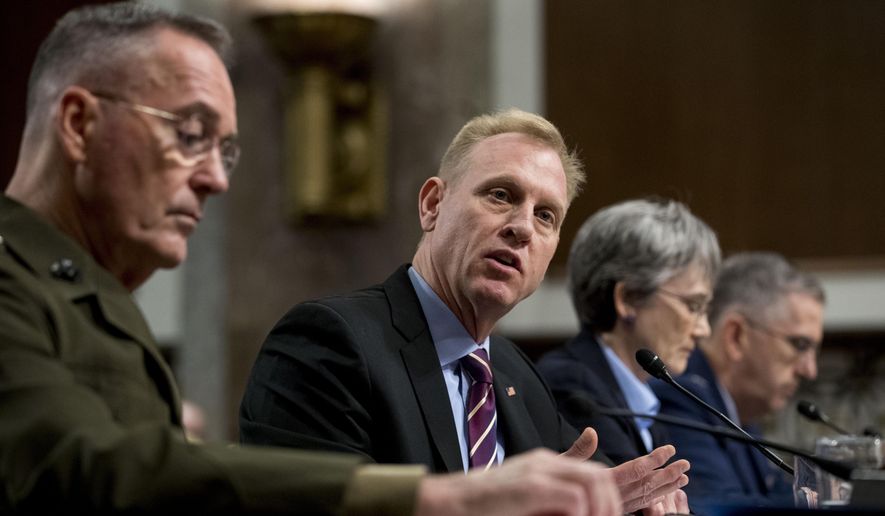President Trump’s proposed Space Force hit its first public roadblock on Capitol Hill Thursday as senators on both sides of the aisle questioned the need to create an entire separate military branch for space.
Top Pentagon officials defended Mr. Trump’s idea before the Senate Armed Services Committee, with acting Defense Secretary Patrick M. Shanahan warning the committee “the next major conflict may be won or lost in space.”
Flanked by Air Force Secretary Heather Wilson, Chairman of the Joint Chiefs of Staff Gen. Joseph Dunford, and U.S. Strategic Command Commander Gen. John Hyten, Mr. Shanahan highlighted growing threats from China and Russia, rivals who have, he contended, “weaponized space with the intent to hold American capabilities at risk.”
While committee members have said they see a need to bolster military space defense, many expressed concerns about the structure, size and cost of the proposed force.
Chairman Jim Inhofe, Oklahoma Republican, said that members “are wrestling with different aspects” of the Space Force idea.
Ranking Democrat Sen. Jack Reed of Rhode Island told the officials, “I fully agree that the threat is real and that changes need to be made to better address the threat. … However, creating a new branch of the armed forces for the first time in seventy years is not a decision Congress should make lightly.”
Mr. Reed cited concerns of creating a top-heavy bureaucracy with positions the Marine Corps does not have, including a separate undersecretary, and a force of about 16,500 members, 10,500 of which would be active duty service members.
Under the current proposal, the Space Force would be established under the Air Force, as the Marine Corps is under the Navy.
On his 100th day as acting defense secretary, Mr. Shanahan said his department’s “space efforts are disaggregated, resulting in a slow, bureaucratic approach,” and defended the proposed leadership positions that he says will bolster space as a priority.
The Pentagon has requested $72 million for the Space Force in Mr. Trump’s proposed $750 billion FY20 defense budget.
Ms. Wilson, who is departing the Air Force next month, said that within 90 days of the signing of legislation the Air Force would designate staff under her branch and by 2024 have a fully operational Space Force.
Sen. Angus King, Maine independent, cited the “if it ain’t broke, don’t fix it,” theory to press for changes to Mr. Trump’s far-reaching plans.
Gen. Hyten told the senator the U.S. needs to have a commander primarily focused on space, and explained that space can never be higher than his third priority as he primarily focuses on strategic deterrent and nuclear command and control.
The committee members, who play the largest role on Capitol Hill in authorizing defense spending, expressed skepticism of the imminent need for the force.
“I guess we need some convincing that there is a necessity for a sixth branch” of the U.S. military, Sen. Joni Ernst, Iowa Republican, said.
But some GOP lawmakers appeared enthusiastic about the idea.
“I can totally appreciate why you need to have a Space Force. I get it,” Sen. Marsha Blackburn, Tennessee Republican, said, citing technological advancements and increasing cyber pressure. Warfare in this century is “going to be different from what we’ve seen in the past.”
And the military officials expressed optimism Mr. Trump’s proposal will be realized in the long run.
“We’re going to have a Space Force some day,” Gen. Hyten said. “I think what the committee has to decide is when is that going to happen.”
• Lauren Toms can be reached at lmeier@washingtontimes.com.




Please read our comment policy before commenting.